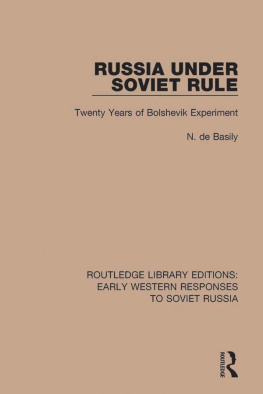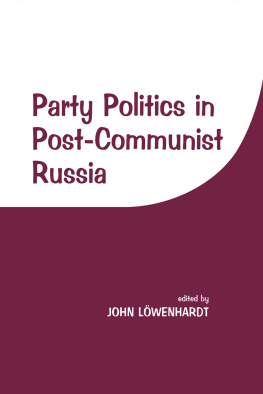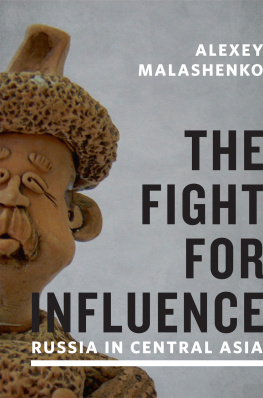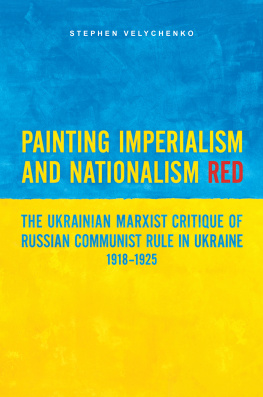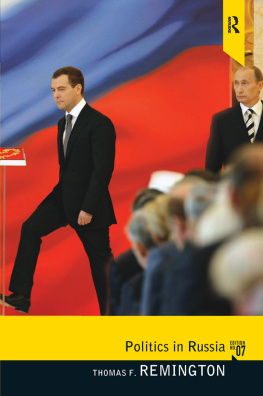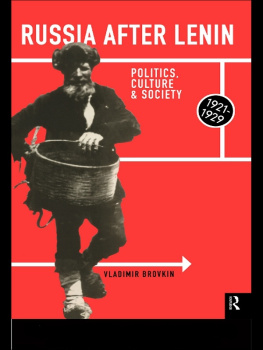ROUTLEDGE LIBRARY EDITIONS: EARLY WESTERN RESPONSES TO SOVIET RUSSIA
Volume 9
BOLSHEVIST RUSSIA
BOLSHEVIST RUSSIA
ANTON KARLGREN
First published in Swedish under the title Bolstevikernas Ryssland
First published in English in 1927 by George Allen & Unwin Ltd
This edition first published in 2018
by Routledge
2 Park Square, Milton Park, Abingdon, Oxon OX14 4RN
and by Routledge
711 Third Avenue, New York, NY 10017
Routledge is an imprint of the Taylor & Francis Group, an informa business
1927 Anton Karlgren
All rights reserved. No part of this book may be reprinted or reproduced or utilised in any form or by any electronic, mechanical, or other means, now known or hereafter invented, including photocopying and recording, or in any information storage or retrieval system, without permission in writing from the publishers.
Trademark notice: Product or corporate names may be trademarks or registered trademarks, and are used only for identification and explanation without intent to infringe.
British Library Cataloguing in Publication Data
A catalogue record for this book is available from the British Library
ISBN: 978-1-138-04993-2 (Set)
ISBN: 978-1-315-11072-1 (Set) (ebk)
ISBN: 978-1-138-06995-4 (Volume 9) (hbk)
ISBN: 978-1-315-11517-7 (Volume 9) (ebk)
Publishers Note
The publisher has gone to great lengths to ensure the quality of this reprint but points out that some imperfections in the original copies may be apparent.
Disclaimer
The publisher has made every effort to trace copyright holders and would welcome correspondence from those they have been unable to trace.
BOLSHEVIST RUSSIA
BY
ANTON KARLGREN
Translated from the Swedish by
ANNA BARWELL
LONDON: GEORGE ALLEN & UNWIN LTD.
RUSKIN HOUSE, 40 MUSEUM STREET, W.C. 1
First published in Sweden under the title
BOLSTEVIKERNAS RYSSLAND
First published in English in 1927
(All rights reserved)
THE present book, originally published in Swedish, deals with the social state of Russia as it now is, after eight years of Bolshevist rule and influence; in it I have traced its development up to the end of 1925.
I have always been interested in Russian social conditionsfrom 1904 to 1916 I visited the country every year and was, amongst other things, correspondent to the Swedish Press in the days of the first Imperial Duma (1906). Hence during the revolution years I have, on the one hand, endeavoured to utilize all opportunities that presented themselves to an outside observer wishing to form a correct judgment of Russian affairsand here, I must own, I took less interest in the Bolshevist theoretical propagandist writings than in the Russian literature and newspapers which reflected these theories as translated into practice; on the other hand, for some months in 1924, I have studied conditions on the spot during a visit to Russia which tended considerably to modify my former conception of Soviet Russia and also, as I had hoped, gave me wider knowledge on which to form a judgment of its further development.
COPENHAGEN,
Spring, 1926.
BOLSHEVIST RUSSIA
THE supreme power of the proletariate! Now, in the ninth year of Bolshevism, what reality lies behind these words expressing, as they do, the very key-note of the Bolshevist system?
The supreme power of the proletariatewhat a perspective these words opened before the eyes of the Russian proletariate when they were first pronounced! It is true this enormous proletariate did not know much about Bolshevism, but they felt they did, since to have read Lenin was all that they needed for complete understanding of the matter. This was something for themand with delight they began to build on the promises contained in the phrase itself. From the first, these words, in their direct simplicity, possessed a note of stimulation and flattery even in the ears of the Western proletariate, especially when accompanied by accounts of all the good things this supreme power was giving to the Russian proletariate.
Has this supreme power fulfilled the expectations of the Russian proletariate and the beliefs of that of the West?
* * *
The supreme power of the proletariatefrom the very first, as we have said, the fact was quite clear to the Russian masses. What else could it mean but that, after the oppression of tsardom, they had now a perfectly free rein? Now, at last, they could stretch their limbsand this they did with such good will that the cracking of their joints was felt throughout the whole social body. Away in the villages the peasants arranged matters according to their own fancy, until the whole land was but one gigantic pyre of their masters property; in factories and workshops the workers took all into their own hands and followed their own inclinations with such lack of restraint that very soon every machine throughout the whole of Russia was brought to a standstill. Order, discipline, every social obligation was thrown overboard. The Russian proletariate began, with full consciousness of their goal, to bring about that social state which, for centuries, had had the warmest place in their heartsviz. anarchy. Centuries of tsardom had not exterminated the anarchical tendencies that are in the very blood of the Russian masses, and now the time had come when they could give full vent to such desires with no fear of consequences. The supreme power of the proletariate was an accomplished fact, and life was pure joy.
The time of real supreme power for the proletariate proved, however, quite short. So long as it was a question of the utter destruction of old Russia, this supreme power supplied the need of the momentthat was a part of the social programme of the Bolshevists which they could leave to the uncontrolled will of the proletariate with unbounded confidence, and one in which the peoples supreme power satisfied even the most exorbitant demands. But when this task was accomplished and followed by the problem of building a new social structure, then came, too, the end of the supreme power of the proletariate, such as they had pictured it in their own minds.


